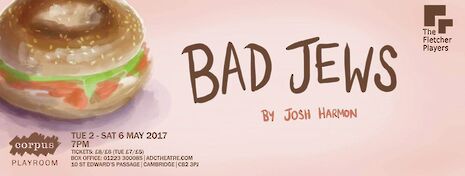Review: Bad Jews
“Darkly humorous and sincerely provocative”, writes Anna Shmatenko, of Elinor Lipman’s production of Bad Jews

Bad Jews's playlist consists solely of those songs that we all know but can never remember the names of. As I stepped through the doors of the Corpus Playroom and into the powerful, all-permeating atmosphere of the anticipated performance, this familiarity offered a fuzzy sense of welcoming safety. The audience shared a moment of quiet mumblings and rhythmic feet-tapping as Diana Ross’ ‘I’m Coming Out’ played in the background, before the lights went down and, with them, our cosy little bubble of security was irrevocably burst.
What we were about to see was less about making ourselves feel comfortable, and more about hoping that, unlike Henry Phillips’ character Jonah, we would manage not to be dragged into the messy family conflict that was unravelling on stage.
“Are the walls caving in?”, Daphna (Alona Bach) cried, pressing her back against the wall, as the theatre seemed suddenly to contract, drawing us uncomfortably close to the centre of the aggressive tirade of verbal attacks and increasing our chances of being caught in the crossfire. This raging tornado of dispute sprung from a toxic reaction between Daphna and Liam (Joe Sefton), two not particularly loving cousins, who had been circumstantially forced to stay overnight in the same room, with the memory of their beloved grandfather’s death still on their minds–and his inheritance still undivided.
And if there’s a will, there’s a pay(out). At least, that’s the impression that I had when I first heard the idea of a dead grandparent and his unsatisfied selfish descendants. However, Bad Jews is not that kind of story; what the characters have at stake is not heaps of gold and acres of land, but a tiny Chai medallion, as well as a decision as to whether it is acceptable for a Jew to date a Christian.
“A challenging play of cultural conflict”
Elinor Lipman’s production of this challenging play of cultural conflict strikes a fine balance between the darkly humorous and sincerely provocative. The characters’ silences flood the theatre with unease and tension, but do not suffocate the audience. The bursts of anger last long enough to make the viewers sink into their chairs in alarm, but not enough to induce them to leave the theatre altogether.
Far from it in fact. The actors knew exactly when to speak calmly, when to raise their voices and when to break into animalistic hollering to create an overall dramatic effect that does justice to the controversy of Joshua Harmon’s writing. Alternating verbal confrontations and periods of silence, broken only by audience’s nervous laughs, finally culminate in an anticipated physical fight, and the choreography, although maybe a little clumsy in the beginning, does not disappoint.
Perhaps the only real flaw of the production is the way in which it occupies the space that is allocated, and, knowing the limitations of the Corpus Playroom, I doubt one can really blame the cast and crew, who have worked so hard to bring this gem into being. For the lack of more room, an important exchange between Liam and Jonah has to take place in the isle offstage, where the emotional potential that the lines of dialogue can inspire in these talented actors is simply stifled. They do their best to make the most of the little patch of the floor that they are given – but unfortunately it doesn’t quite work.
Nevertheless, soon afterwards the pair are able to step out onto the main stage, and this brief clumsy scene gets quickly forgotten. And if you think that Jonah doesn’t do or say much after this dialogue, just wait until the end; I guarantee you will to be pleasantly surprised
 Features / Should I stay or should I go? Cambridge students and alumni reflect on how their memories stay with them15 December 2025
Features / Should I stay or should I go? Cambridge students and alumni reflect on how their memories stay with them15 December 2025 News / Cambridge study finds students learn better with notes than AI13 December 2025
News / Cambridge study finds students learn better with notes than AI13 December 2025 News / Dons warn PM about Vet School closure16 December 2025
News / Dons warn PM about Vet School closure16 December 2025 News / News In Brief: Michaelmas marriages, monogamous mammals, and messaging manipulation15 December 2025
News / News In Brief: Michaelmas marriages, monogamous mammals, and messaging manipulation15 December 2025 Comment / The magic of an eight-week term15 December 2025
Comment / The magic of an eight-week term15 December 2025








